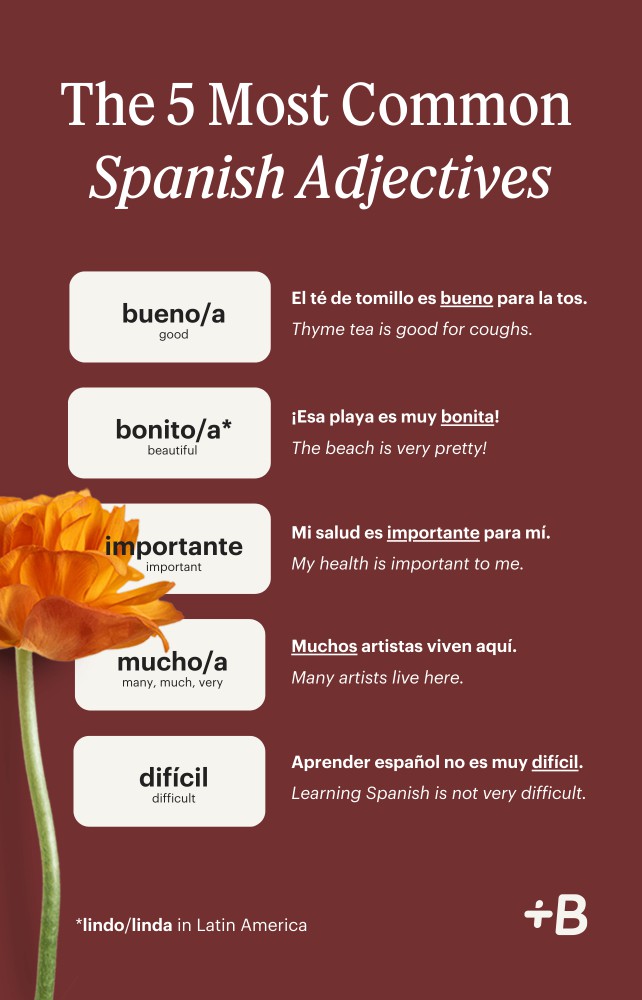When you first start learning a language, you’ll be confronted by a huge amount of vocabulary. Learning the names of all the different things you’ll encounter is worthwhile, but when you’re running around in a different country, sometimes you’ll encounter something you don’t remember the noun for.
Fortunately, there’s something that can save you: adjectives! Learning the most common adjectives in Spanish will help you distinguish between things or refer to things when the name is right on the tip of your tongue. Here’s a quick guide to some of the most important Spanish adjectives, which should give you a good grounding in your studies. And if you’re looking to brush up on your Spanish verbs, too, we have a guide for that.

The Top 15 Spanish Adjectives
1. bueno/a — good, great
Examples:
- El té de tomillo es bueno para la tos. — Thyme tea is good for coughs.
- ¡Qué bueno! — That’s great!
2. bonito/a (Spain), lindo/a (Latin America) — beautiful, pretty, cute
Examples:
- Esa playa es muy bonita. — That beach is very pretty.
- ¡Que lindo es el monitor de esquí! — What a cute ski instructor!
3. importante — important
Examples:
- Mi salud es importante para mi. — My health is important to me.
- Uxmal es una ciudad maya muy importante. — Uxmal is a very important Mayan city.
4. mucho/a — many, much, very
Examples:
- Lo siento mucho. — I am very sorry.
- Parece que en este barrio viven muchos artistas. — Many artists are supposed to live in this neighborhood.
5. difícil — difficult
Examples:
- Aprender español no es muy difícil. — Learning Spanish is not very difficult.
- Es muy díficil elegir. — It’s very difficult to choose.
6. grande — big
Examples:
- la casa grande — the big house
- Tenemos una tienda grande. — We have a big tent.
7. pequeño/a — small, little
Examples:
- El pequeño pueblo pintoresco tiene solo veinte habitantes. — The small picturesque village has only twenty inhabitants.
- el hermano pequeño — the little brother
8. divertido/a — fun, funny
Examples:
- ¡Qué divertido! — How funny!
- ¡Es divertido pasar la aspiradora! — It’s fun to vacuum!

9. fácil — easy
Examples:
- La melodía es bastante fácil de cantar. — The tune is quite easy to sing.
- ¿Fue fácil vivir juntos? — Was it easy to live together?
10. antiguo/a — old
Examples:
- El castillo es antiguo. — The castle is old.
- La tradición es antigua y significativa. — The tradition is old and meaningful.
11. rápido/a — fast
Examples:
- El tren es rápido y eficiente. — The train is fast and efficient.
- El corredor es rápido. — The runner is fast.
12. joven — young
Examples:
- El artista es joven y talentoso. — The artist is young and talented.
- La generación joven es innovadora. — The young generation is innovative.
13. feliz — happy
Examples:
- Ella está feliz con su logro. — She is happy with her achievement.
- El niño está feliz. — The child is happy.
14. lleno/a — full
Examples:
- El vaso está lleno de agua. — The glass is full of water.
- El estadio está lleno de aficionados. — The stadium is full of fans.
15. vacío/a — empty
Examples:
- El cuarto está vacío y silencioso. — The room is empty and quiet.
- Mi estómago está vacío. — The stomach is empty.

Comment